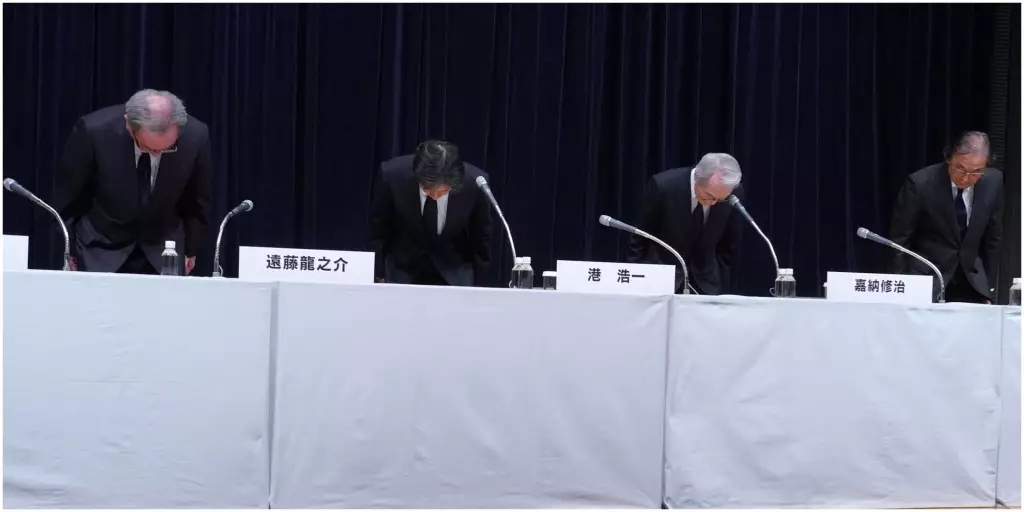In a landscape where accountability is progressively becoming a non-negotiable expectation, the recent resignations of the Chairman and President of Fuji TV, Shuji Kano and Koichi Minato, respectively, have raised critical questions about leadership ethics in the media industry. These resignations followed grave accusations surrounding acclaimed presenter Masahiro Nakai, embroiled in a sexual misconduct scandal that has shaken public trust in one of Japan’s foremost commercial broadcasters. The press conference announcing their resignations underscored the gravity of the situation; the executives bowed their heads in a traditional gesture of apology, signaling a recognition of their failures to protect both their employees and viewers.
Reports indicate that Nakai, a former member of the popular boyband SMAP and a prominent television host, was accused of sexually assaulting a woman during a dinner event organized by Fuji TV staff in 2023. Despite allegations surfacing back in December of that same year, network executives did not act decisively, prioritizing what they claimed was the “woman’s physical and mental recovery.” This questionable rationale struck a chord of indignation among advertisers and the public. Many companies swiftly pulled their advertisements from the network, indicating the potential for deep financial repercussions stemming from a perceived cover-up and lack of transparency.
As the fallout continued, Fuji TV was compelled to hold an extraordinary board meeting, culminating in the establishment of a third-party committee dedicated to investigating the incident. This move, though necessary, reveals a reactive approach rather than a proactive one, and the fundamental issue remains: why was there a delay in addressing such serious allegations?
In the wake of these developments, the promotion of Kenji Simizu to the position of President arose as a beacon of hope for recovery and reform within the network. In his first statements, Simizu expressed a commitment to “starting from scratch,” emphasizing a zero-tolerance policy for any behavior that violates human rights. While these sentiments are laudable, they also beg the question of why such a stance was not adopted sooner. This new ethos must be accompanied by concrete policies and actions that prioritize transparency and accountability throughout the organization’s structure.
Fuji Media Holdings’ acknowledgment of their shortcomings marks a pivotal step toward regaining public trust. They have committed to fully cooperating with the third-party committee’s investigation and expressed sincere apologies to viewers, advertisers, and other stakeholders affected by the scandal. However, a mere apology is insufficient to restore confidence; systemic changes must follow.
The implications of this scandal extend beyond Fuji TV itself, serving as a stark reminder of the pervasive issues of sexual misconduct that have permeated the Japanese entertainment industry. The allegations against Nakai echo a broader reckoning taking place within the industry, a movement ignited by the unfortunate legacy of late talent agent Johnny Kitagawa, against whom over a thousand individuals have lodged complaints.
On the broader stage, the reaction from shareholders, notably Dalton Investments and its UK counterpart, Rising Sun Management, highlights prevailing frustrations with corporate governance in media. Their “outrage” was publicly articulated, reflecting a growing impatience among investors, who demand accountability from institutions that wield significant influence over public perception.
The resignations of Shuji Kano and Koichi Minato serve as a significant, albeit painful, reminder of the importance of leadership accountability in navigating crises of ethical nature. As Fuji TV embarks on the journey of reform under new leadership, the pressing question remains: Will this scandal be merely a fleeting issue, or will it instigate lasting cultural changes within the Japanese media landscape? Failure to address these critical questions could lead to continued erosion of trust among viewers and advertisers alike, with long-term implications for the credibility of one of Japan’s leading broadcasting institutions.
